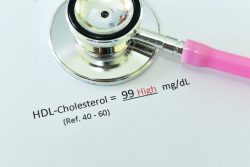 For a long time, high “good” cholesterol levels have been praised for their cardiovascular benefits and associated with a decreased risk of disease. However, recent findings indicate that there might be a downside to having excessive amounts of this health marker.
For a long time, high “good” cholesterol levels have been praised for their cardiovascular benefits and associated with a decreased risk of disease. However, recent findings indicate that there might be a downside to having excessive amounts of this health marker.
Research now shows that extremely high levels of high-density lipoprotein (HDL) cholesterol could be linked to a heightened risk of cognitive deterioration and dementia. Contrary to what one might expect, elderly individuals with the most elevated levels of this cholesterol type were found to be at a greater risk of developing dementia compared to those with moderate levels.
Cholesterol exists primarily in two types: low-density lipoprotein (LDL), known as the “bad” cholesterol due to its role in arterial plaque formation, and high-density lipoprotein (HDL), often hailed as the “good” cholesterol for its ability to transport surplus cholesterol to the liver for elimination. HDL is generally considered protective against heart disease. However, the notion that high levels of HDL are invariably advantageous is questioned by recent research, indicating that too much of this supposedly beneficial compound might actually pose a health risk.
The analysis involved 18,668 individuals aged 65 and older who were initially part of the Aspirin in Reducing Events in the Elderly (ASPREE) trial. Findings from the study indicated a 42% increase in the risk of dementia for adults older than 75 with very high levels of HDL cholesterol. For this demographic, HDL levels between 60 and 80 mg/dL were identified as optimal. Moreover, the research pointed out that those with HDL levels exceeding 80 mg/dL faced a 27% increased risk of dementia across the board. However, it’s crucial to understand that exceptionally high HDL levels are typically the result of genetic factors and are not a common concern for the majority.
Although HDL cholesterol is recognized for its significance in heart health, this study underscores the necessity for additional investigation to grasp the implications of extremely high HDL cholesterol levels on brain health.
While more research is needed, the results of this study question the widely held view that elevated levels of HDL cholesterol are always advantageous. They indicate that achieving a balanced cholesterol profile might be crucial for healthy aging.
To view the original scientific study click below:
Association of plasma high-density lipoprotein cholesterol level with risk of incident dementia: a cohort study of healthy older adults





